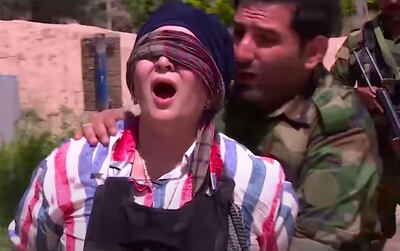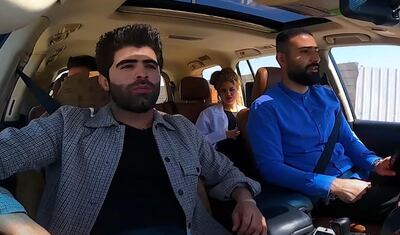In an episode of Tanb Raslan (Raslan's Shooting), Iraqi footballer Alaa Mhawi is on his knees, blindfolded and with a bomb vest strapped to his chest. In the room with him are half a dozen armed-militants. One has the ISIS flag hanging from his back, another pulls at Mhawi's hair, yelling "Islamic State in Iraq and the Levant" to his face. Gunfire bursts at regular intervals around him.
“I am your brother,” Mhawi tells his captors. “I am a national symbol of Iraq. I am a footballer.” The right-back, who plays for Iraq’s national team, is pleading for his life, saying anything that might spare him the brutal end that, as an Iraqi, he has heard much about.
What Mhawi does not know is that he is the victim of a prank show. That as soon as the blindfolds will come off,Raslan Haddad, presenter of Tanb Raslan, will greet him – in full military garb and with the Iraqi flag draped on his shoulders – beaming, applauding and congratulating Mhawi.
Mhawi’s face is blank. He is confused, trembling and seems on the verge of snapping. Who in their right mind thought this was entertainment?
Besides resembling the terror of ISIS, what Mhawi has just gone through is an experience reminiscent of the infamous mock execution that Fyodor Dostoevsky underwent in 1849. The Russian novelist was convicted and sentenced to death for being part of a literary group that discussed banned books critical of Tsarist Russia.
On a frigid December morning in St Petersburg, Dostoevsky – in his twenties then – along with a handful of others, was blindfolded and made to stand in front of a firing squad. Dostoevsky heard the clicks of the rifles loading, heard the command for the riflemen to aim. But just then, a messenger arrived on horseback, telling the riflemen that the tsar had pardoned the men.
This was not a last-minute gesture of clemency. The execution had been staged from the start and was one of Tsar Nicholas I's preferred terror tactics. Nevertheless, the mock execution felt all too real for its victims. Two of those standing with Dostoevsky that day went insane, unable to grasp the fact that their lives would continue after having faced certain death. The trauma also left a lasting mark on Dostoevsky and he'd go on to allude to the experience in his novel The Idiot.
It is difficult to see what the Iraqi celebrities experienced in Tanb Raslan is much different – if not worse. Actress Nessma fainted as the pranksters fitted her with a bomb vest. Singer Baida Rasheed wept, repeatedly asking god for mercy, as Kalashnikovs blared around her. Actor Reda Taresh, after finding out he'd been the victim of a prank and not an ISIS attack, walked in circles in the dirt patch outside the house, panting and muttering bleeped-out curses.
The incurred trauma is all too real, even when the kidnappings are revealed to be a fake. Of course, the experience Haddad's victims have undergone will likely not be recognised as a traumatic one. They were, as far as many are concerned, never in danger to begin with.
Haddad has defended the show, saying it presented ISIS militants in a cynical way. He told Al Hurra TV channel that his critics simply did not want Iraq’s security forces to appear heroic and even alleged that the show’s participants contacted him after to praise his idea and tell him that he was presenting “a purposeful message”.
But Haddad misses the point. What message is there to give when you're allowing another person to live the terror of ISIS? And if the message is noble, at what cost? Tanb Raslan is cruel, even tone deaf – considering the threat of military violence in Iraq – and airing it raises questions as to where the limits of candid-camera comedy lie.
One Twitter user, Ali Almadany, writes: “Is this show meant to make us laugh or make the world laugh at us? Please stop the show.”
A rising trend of torture comedy
Last Ramadan, Ramez Galal's Ramez Majun Rasmi was arguably the most controversial show to air on Arab television. The show marked a new level of sadism and cruelty, strapping stars to a torture chair, throwing snakes at them and dunking them in a tank full of crabs. Despite criticism, the show was never pulled off the air. It had good ratings. As far as the broadcasting company was concerned, Galal was doing what he was being paid to do.
In fact, Galal has returned this year with Ramez Aqlahu Tar, and, if anything, it seems to have inspired other shows to take a similar approach.
Besides Tanb Raslan, there is Talqat Tony (Tony's Bullet), a show that terrorises guests with fake shootings. In one episode, Iraqi singer Tayseer Al Iraqiya is made to watch the show's host shot by a gunman. When she eventually finds out the prank, she faints. The host is meanwhile in stitches.
Both shows were pulled off the air by Iraq’s Communications and Media Commission. Several episodes, however, are still available on YouTube.
Another show that took it too far is Angelina 19. The Tunisian show brings on a new celebrity every episode to what they think is a panel discussion about Covid-19. Soon an Angelina Jolie lookalike arrives, pretending to be the star in her role as a goodwill ambassador for the UN. The fake Jolie tells the live audience she is donating thousands of doses of a vaccine "approved by the WHO" to Tunisia, and persuades them to get vaccinated on camera.
But events take a turn when two of the actors in the show fall to the floor, convulsing and screaming in pain, shortly after receiving the fake vaccine. Chaos ensues and one of them is “pronounced dead”. The candid camera captures the shock and horror of the celebrities.
In a world still gripped by the pandemic, the ethical ramifications of the show needs little elaboration.
The answer may be ahead of the problem
The answer lies at the very start. Broadcasters know the shows as they are being pitched to them but controversy has proven to be a viable marketing tool. It generates headlines and, in turn, free advertising.
In the past few days, Tanb Raslan made headlines across the world. And even if the show was pulled off the air, it will still be discussed, people will watch it online. It is free, guaranteed publicity.
While broadcasters will do what is lucrative for them, viewers have a responsibility not to allow these shows to capitalise on people's suffering. We are setting dangerous precedents here, and Tanb Raslan may seem timid in comparison to the torture-comedy of tomorrow, just as Ramez Majnoun Rasmi seems relatively tame today. That thought is terrifying.










